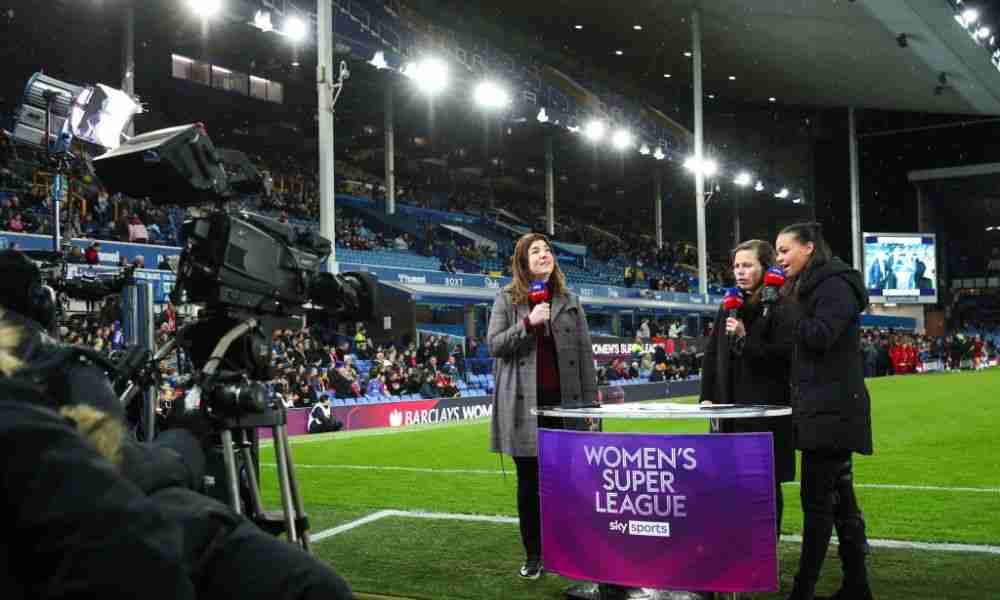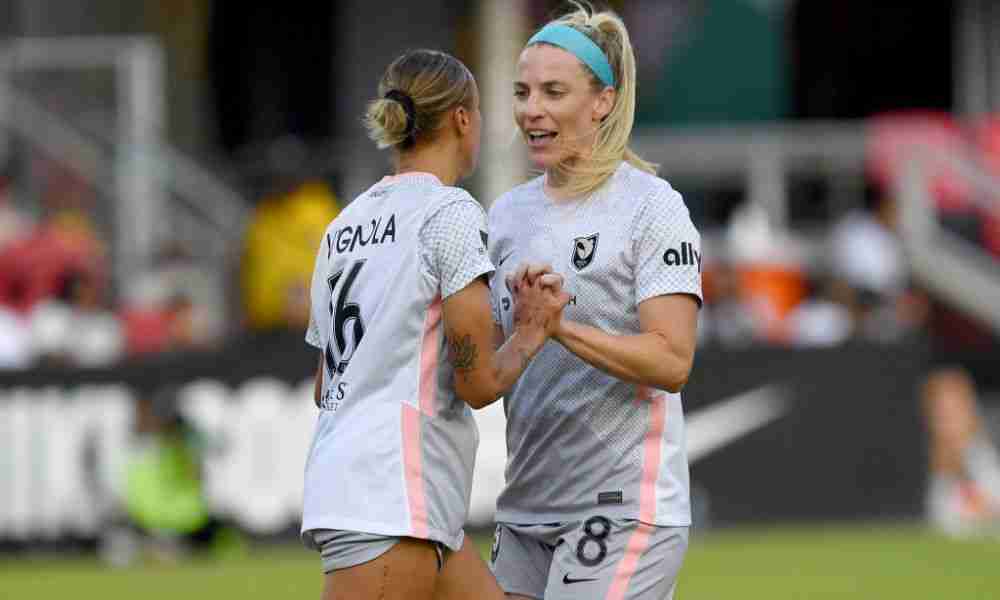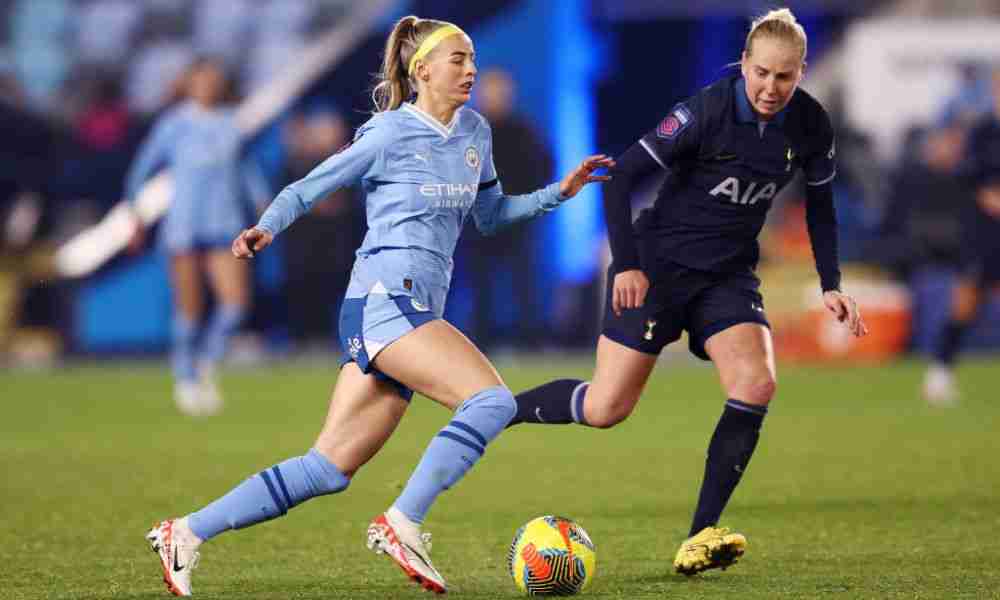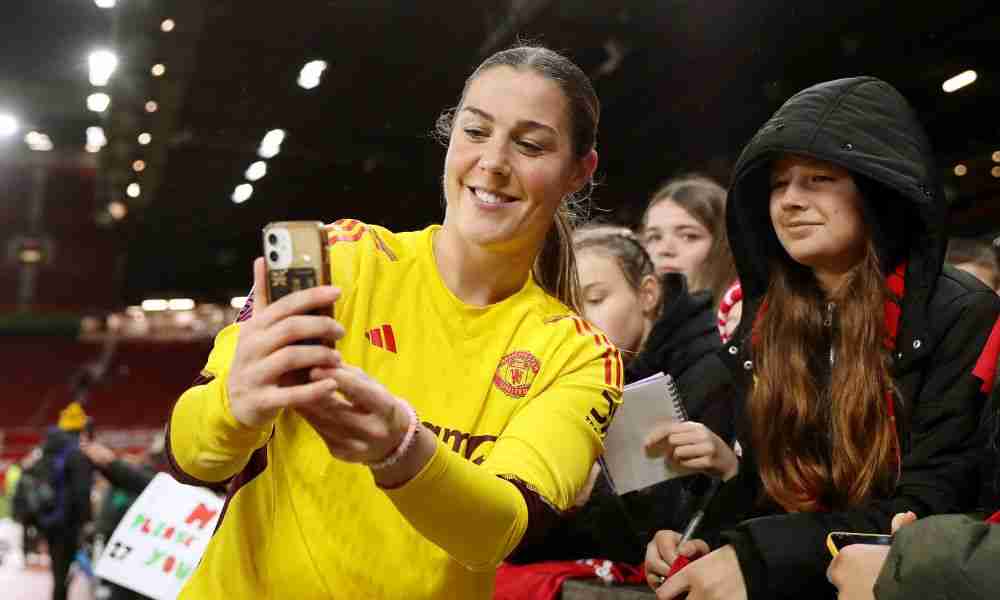Having already made giant strides in recent years, UK women’s soccer is bracing itself for a seismic 2024.
A new independent body is being formed to take over from the Football Association (FA) in running the women’s professional game. Led by Nikki Doucet, NewCo will govern the top two divisions in England, with the primary goal of driving new revenue that can fuel sustainable growth for the sport.
The Women’s Super League (WSL) is also set for a bumper lift in revenue from a new domestic media rights deal set to be unveiled later this year. The existing agreement, which expires at the end of this season, is worth UK£8 million (US$10 million) per year. Current partners Sky and the BBC are expected to make offers to retain the rights, with pay-TV broadcaster TNT Sports also rumoured to be in the picture.
For the Wasserman agency’s group managing director Lenah Ueltzen-Gabell, the priority for 2024 is for the sport to continue growing its audience.
“Patience is my one ask for this year,” she tells SportsPro. “Let’s continue to double down, let’s get people going to every match every day, buying tickets, tuning in, and making it part of their daily routine.
“We should probably have another couple years of that before we start getting too crazy about comparing the men and the women’s media numbers or sponsorships. I know the sports industry is not known for its patience. But that would be my goal or my wish.”
Why free-to-air coverage remains crucial to audience growth
With interest in women’s soccer continuing to grow, leagues and broadcasters have flirted with the idea of putting games behind a paywall, as a means of increasing revenue streams from higher rights fees and paid subscriptions. But it has proven a major challenge, with DAZN recently making its women’s soccer coverage freely available again and ditching its original plan to have viewers pay to watch from this season.
According to Jo Tongue, a board member of Women in Football and the chief executive of the Tongue Tied Management agency, which represents the likes of England captain Leah Williamson and Chelseamanager Emma Hayes, the sport has a long way to go before that can become a viable reality. She believes that younger fans are unlikely to buy subscriptions on their own, and that setting up a paywall would therefore create barriers that could turn them away.
“I don’t want it behind a paywall, because we are still a growth sport,” says Tongue, speaking on the SportsPro Podcast. “We are still trying to find our mass audiences. Yes, we’ve got the mass audiences on the international stage – at tournaments, we have ten million people watching the Lionesses.
“But week to week, we are in a growth stage. We’re trying to find out who the audience actually is. Is it current men’s football fans that we’re trying to bring across? Or is it that we’re trying to reach whole new audiences? Is it an amalgamation of both?
“So while you’re still in that phase, I just think don’t shut any doors. You need to keep them open.
“What’s happening now is brilliant and exciting, but we should not ruin it by jumping too quickly, and work on the build rather than try and jump. It’s almost like when you’re selling a business – you don’t want to sell too soon, because you haven’t reached the full potential.”
Ueltzen-Gabell believes the fact the debate around putting women’s soccer behind a paywall is happening is a sign that the game is “maturing”, but ultimately agrees it would be too soon to abandon free-to-air (FTA).
“It’s not a negative, but people are too quick to do that, and too quick to take the financial investment in order to grow the game,” she says. “I agree with Jo – it’s too early, we need to walk before we can run. We now have people interested and are looking for the content. We now have demand, whether it’s on streaming, whether it’s online, wherever else it is.
“But let us be really successful there, before you put it on a paywall. It’s about that long-term game. Because we’ve seen a little bit of success coming off the back of the Lionesses’ amazing Euros, everyone wants to take advantage of it. We just need to slow down.”
The risk of only focusing on the value of the WSL’s TV deal
Speaking to SportsPro last year, Sky Sports’ head of women’s sport Jo Osbourne discussed how the company invests in its broadcast quality to grow the WSL’s appeal.
Ueltzen-Gabell believes that Sky’s involvement is important for drawing in soccer fans accustomed to the detailed coverage it provides for the men’s game, particularly given the limitations FTA broadcasters may have with scheduling.
Many fans are keenly awaiting news of the next domestic rights deal for the WSL, which is due to be announced this year and is expected to deliver an increase on the existing contract. For Ueltzen-Gabell, though, there should be more focus on how the agreement will grow the game’s audience, and less on the value of the deal.
“I think it’s more important that we get the coverage that we need, and getting the carrier and the coverage that we need is probably more important than these [financial] numbers,” she explains.
“In the grand scheme of things, these are so much smaller numbers than the men’s game. Yes, they’re groundbreaking. And we could be up X amount of per cent, and it feels good, because it reinforces all the jobs that we’re doing.
“I might be in the minority here, it would be a great stamp of approval if we can get that double-digit growth on the rights fees. But to me, it’s more about the what, than it is on the how much. For us right now, it is really about making sure that they do proper investment in the production, and then in the highlights and other pieces.
“It’s way more important to me than any sort of record-breaking rights [fee], because we’re still talking about big percentage increases on not very much in the grand scheme of football media rights.”

Why Angel City’s commercial model may not work for every women’s soccer club
One women’s soccer club that has taken a unique approach is National Women’s Soccer League (NWSL) franchise Angel City FC.
The Los Angeles-based team is backed by an army of celebrity owners and under its president Julie Uhrman has established a purpose-driven business model that involves giving ten per cent of its sponsorship revenue back to the local community, which has helped it build a vast partnership portfolio. It has also raised additional capital through a Series A financing round in 2022 that reportedly valued the outfit at US$100 million.
While it has been cited as a potential blueprint for other teams to follow, Ueltzen-Gabell cautions that what works in LA may not apply everywhere in the world, including in the UK.
“I think they’ve done a brilliant job,” she says. “They have an amazing concept, and for LA, for that club, for what they’ve done, for everything they stand for, it works for them.
”Unless you are going to literally walk the walk on that and talk the talk, I think you could try and do that. But it’s going to need a real shift in mindset in order to get to that. I would be fearful that people would almost try to do it a little bit, because they’re still worried about paying their payroll, they’re still worrying about the numbers and the gate receipts and everything else.
“Angel City has made a commitment and they have really strong backers. Everyone has bought into this ethos around it, so it works for them. So I would hesitate in advising other clubs to do the same, unless they’re really going to take that long-term view of this and say, ‘Okay, for the next five years, we might be in the red for a bit, but this is what we’re going to do.’
“They have to make that investment. And if they do it, then that’s great. My fear is just the halfway house of that.”

Tongue, meanwhile, points out that the amount of community work WSL clubs already do would make it hard for one to stand out from the pack like Angel City have in the NWSL.
“We all love the Angel City story, but is it successful because of the celebrity around it, because of the excitement around it?” Tongue asks. “Or is it successful because they give ten per cent to the local community?
“I don’t think if any of the WSL teams said they were going to give ten per cent of their profit to the local community, if that would make me support the club, because all the clubs do great CSR work.
“All the clubs have good foundations. They maybe just don’t shout about it in a way – or we don’t listen in a way – that we do with Angel City because it’s got some famous people talking about it.”
Tongue also questions whether directly adopting the Angel City model would be effective for UK-based sides, given that many women’s teams in the WSL are still reliant on infrastructure provided by their male counterparts.
“The other thing is Angel City were able to build a stadium from scratch that catered for their audience,” she adds. “As a women’s football fan in the UK, we’re going to a ground that was built mainly for men.
“They [Angel City] have done it so well, because they literally started from scratch. Whereas in this country, we’re kind of jumping on something and trying to shift it to work for this new audience that we’re trying to cater for. I don’t know that you pick it up and replicate it here.”

Ensuring new sponsors understand the importance of investing
With the profile of women’s soccer continuing to grow, it has naturally led to more commercial partnerships for players, clubs and leagues. From her vantage point, Ueltzen-Gabell has seen an increasing willingness from sponsors to engage with the sport in a way that supports the growth of the game.
“In the women’s space, they [brands] really want to work with you,” she notes. “It’s not as off the shelf. There’s more space to try things.
“I think the appeal of football is so great, there’s so many eyeballs. It is the number one global sport, people live and die by it and are tribal. But that also doesn’t leave a lot of space for creativity. There’s also a potential opportunity to polarise some of the fans or to turn them off by working too closely with a partner or a sponsor.
“In the women’s game, you’re just enabling access, content, engagement and providing value to the fans, providing value to the players. You’re providing something that they don’t have to further enjoy the sport that they’re watching or playing.”
As more brands enter women’s soccer, Ueltzen-Gabell believes the most successful partnerships are those underpinned by companies who understand that they need to activate those sponsorships a little differently.
“I don’t think a lot of people are investing in women’s sports in the same way they invest in men’s,” she continues. “I think the industry has moved on, and we understand that it’s not about if I’m going to invest, it’s how I’m going to invest. It has to be different and [you have to] understand how to get the best out of the players and the talent.
“You need to give them a reason to believe, to build programmes around them and around storytelling. But you have to understand all the different players in order to get the most value out of it. I think the partners and sponsors that are coming into the space know that, and so they’re trying to get smart as they come in. They are literally putting themselves with a lot of trust in everyone’s hands, and it’s working.
“Those are the people that are succeeding in this space. They understand what they’re buying, they understand they know what they don’t know. And they understand that they need to let the experts help them understand how to help grow here.
“But they also have to have a sense of partnership as they’re doing this. It’s not about paying money to therefore get marketing inventory. It’s more understanding that they’re investing in the future of women’s sports, which is super important.”
The quotes used in this article are taken from an interview with the Wasserman agency’s group managing director Lenah Ueltzen-Gabell and Jo Tongue, a board member of Women in Football and the chief executive of the Tongue Tied Management agency on the SportsPro Podcast. To listen to the full episode, click here.




